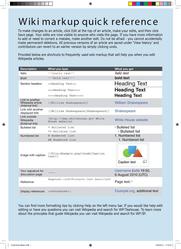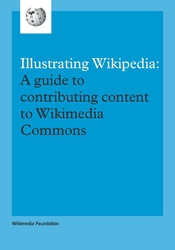Training/Handouts
Handouts
These are the training handouts available through Wikimedia UK:
Find out more about outreach materials.
Discussion/ideas
This should probably be moved to the talk page:
As of February 2014, there is one standardised WMUK training handout, namely the:
- Cheatsheet
This is a short wikitext introduction on thin card, dating from 2012.
Wikipedia editing is in itself on an evolutionary path, with numerous incremental changes made to the interface, and user experience that varies over time, and according to an editor's status. For example newcomers do not have the same range of features, may be subject to tests such as capchas, and will have their preferences set up by default to a standard which itself is changed.
Very prominently there is the new
- Visual Editor
which is a WYSIWYG editor for Wikitext. It is still under development, and is available in preferences. No one currently regards this as a finished product that a typical editor would use as their only Wikipedia editing interface.
A point that needs discussion is whether the cheatsheet should be modified in the light of the Visual Editor, or whether there should be a parallel development of another handout.
A further area in which documentation could be very useful is
- Article creation
Here the gulf between the newcomer and the established editor is very large. Technically speaking, creating articles is really easy (if you edit the browser line, say). As a training issue it is fraught with half-a-dozen key points:
- notability and choice of topic;
- choice of title;
- drafting (sandbox and Draft: namespace);
- redlinks, copying over of wikitext (for the non-autoconfirmed);
- minimum requirements to survive speedy deletion nomination;
- avoiding orphans and adding categories as basic good practice.
This is all before encyclopedic writing, content policy and manual of style considerations. The whole business needs to be preceded by some research and marshalling of references.
There would seem to be a need for a guide for prospective trainers. Some things, such as choosing a topic and gathering references, are time-intensive, and are not always really feasible within a workshop. The solution is to ask for attendees to come prepared, which is a counsel of perfection.
Another area is worth considering:
- Top tips
Things like autofills from DOIs and the Google Books reference generator http://reftag.appspot.com/ may actually make a very positive impression on workshop participants.






